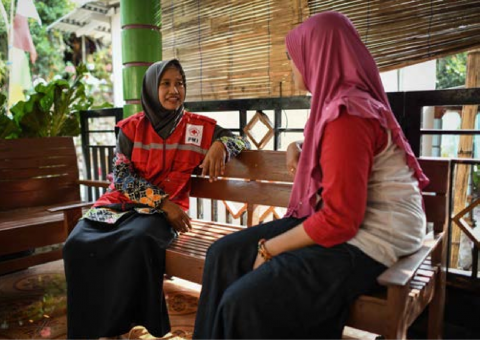The International Federation of Red Cross and Red Crescent Societies (IFRC) is fully committed to creating a safe, inclusive and dignified environment for the communities we serve, and for all our volunteers and staff.
Anyone can report any incident or misconduct that affects the integrity of IFRC personnel, assets or operations. This includes: fraud and corruption, sexual exploitation and abuse, harassment, child safeguarding, security incidents, health and safety, information security breaches and emblem misuse.
Want to know more? Read our FAQ or click the link below to report an incident or misconduct.
You can report any misconduct or integrity incident, involving Red Cross or Red Crescent operations or personnel, especially violations of applicable laws, the Code of Conduct or other organisation regulations and policies (Staff Regulations, Prevention of Sexual Exploitation and Abuse, Child Protection, Anti-Harassment Guidelines, Fraud and Corruption, Security Regulations, Health and Safety, IT use, etc.) via this reporting system.

The steps and resources included below are specific to reporting, investigating and responding, and are adapted from the PSEA Manual, which covers the entire development of a safeguarding policy from planning to implementation.
These steps can also be accessed on the Key Actions page to be seen in context with the others.
It can be very difficult for individuals to report SEA concerns and we know that it can take years for an individual to come forward with an allegation of sexual exploitation or abuse, such as rape or sexual harassment. This is why trust is paramount as well ensuring that enough time is allowed for survivors to heal and recover.
As it is currently the case that many community members will not make a report, it is important to give volunteers and staff training and access to a safe reporting mechanism.
To learn more, read Guideline 13 of the Manual, Reporting SEA Concerns, as well as the IFRC's Whistleblower Protection Policy, which National Societies can adopt in lieu of their own policy.
See also the Reporting Concerns page on the PGI Hub, or the page on the main IFRC website.
For examples of incident reporting forms, see Tool 8 of the Manual and the PGI in Emergencies Toolkit, under the Implementation chapter. Soon to be published is the Do's and Don't's of Responding to SEA guidance.
How a report of SEA is handled can be a significant factor in the psychological impact on a survivor, as well as during their recovery. The organization is accountable for the way in which it responds to SEA. All complaints should be managed in a timely, fair and appropriate manner, with the safety of all persons involved given priority at every stage.
Investigations should be carried out by qualified, objective investigators, who have professional training and experience in conducting SEA inquiries.
To learn more, read Guideline 14 of the Manual, Investigating and responding.
Read more about IFRC's Office for Internal Audits and Investigations (OIAI) responsibilities and procedures. This office oversees SEA investigations for the IFRC.
When there is an allegation of SEA, it is essential to put the welfare of survivors and whistleblowers at the center of our response (and not just focus on the subject of the complaint). This approach helps avoid causing further harm.
The most senior representative of the National Society in the field is responsible for ensuring that assistance is provided.
To learn more, read Guideline 15 of the Manual, Providing assistance to survivors.
